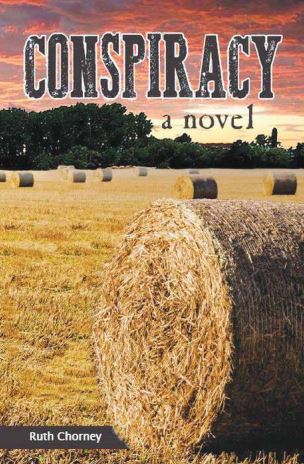
At just 170 pages, Ruth Chorney’s Conspiracy is on the slim side for a novel, but let me assure you that there’s loads of tantalizing literary meat in the Kelvington, Sask. writer’s latest book, and I devoured the convincing story in one pleasant sitting.
Chorney’s already got four children’s books and one other “Deer Creek” (Buried) novel under her belt, as well as anthology and magazine publications, so she comes to this story with plenty of publishing experience and it shows in the streamlined writing. She’s got a strong handle on pacing, plot (it zooms), physical descriptions – she’s especially good at describing northeastern Saskatchewan’s rural landscapes and the seasonal business of farming – and dialogue. What’s more, she truly captures the culture of rural life in “The Land of Living Skies,” through word, deed, and community activities.
The story revolves around the musician, dreamer, and former world traveller, Joel Weston. Five years earlier he’d married Krissy, a Saskatchewan farmer’s spoiled daughter and agronomist with Nu-Ag, and Joel’s now running Krissy’s aged father’s cattle (“forty head of Simmentals”) and grain operation. “What Krissy wants, Krissy gets” is a recurring statement in the story; even her own cousins prefer Joel’s company to hers. The divide in the couple’s relationship can be explained via dogs: Krissy owns a yappy Shih Tzu, Mitzy; Joel longs for a proper cattle dog.
The other important and well-drawn character is Grace Matthews, a small and sprightly farm woman dealing with her husband’s dementia. Joel and Grace’s friendship begins in the forest, where both are foraging for mushrooms.
I’m guessing the author’s own love of the land played heavily in her rural descriptions: “Although the pasture was fenced for cattle, it was changeable and wild, a place where deer, elk and moose wintered, where black bears foraged for grubs and berries in the summer, where coyotes and sometimes wolves howled their freedom …”. Saskatchewan’s underscored via discussions about “snow along the fence lines,” farm chemicals and machinery repairs; through food including perogies, and “jellied salad” at the “Community Fall Supper;” mentions of The Western Producer, and the Co-op that provides “fuel, farm supplies and groceries;” and even through “the provincial government’s (privatization of) the bus line,” which forces many seniors to rely on “family and friends for a trip to the city”. (The bus issue hit a note with me: my parents live in Watrous, and must indeed rely on others for frequent medical appointments in Saskatoon.)
I enjoyed this page-turner for the writer’s clear reverence for the prairie and farm living; the interesting dynamics between the multigenerational characters; and how easily I was transported to – and happy to remain in – a world that rings true. Joel “had tasted the air beside oceans, on mountain tops and in pine forests; nowhere in the world did it smell as good as in Saskatchewan”.
Yes, “Feeding the world (is) complicated”. This gripping novel spotlights the people who dedicate their lives to it, and it does so with grace. Thank you, Ruth Chorney.
THIS BOOK IS AVAILABLE AT YOUR LOCAL BOOKSTORE OR FROM THE SASKATCHEWAN PUBLISHERS GROUP WWW.SKBOOKS.COM
-Shelley A. Leedahl
